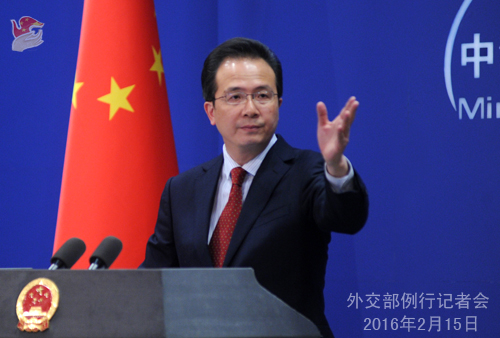
BEIJING, Feb.15 (Xinhua) -- China on Monday hoped for an easing of tension on the Korean Peninsula against the backdrop of a sensitive and complex situation.
Foreign Ministry spokesman Hong Lei made the remarks when asked to comment on the shutdown of an inter-Korean industrial zone last week.
The Democratic People's Republic of Korea (DPRK) decided Thursday to shut down the Kaesong Industrial Zone and deport all people from the Republic of Korea (ROK) staying there. All assets of ROK companies operating there were frozen.
The move came a day after ROK announced its decision to stop operations at the zone, which started manufacturing products in December 2004.
Pyongyang launched a satellite-carrying rocket, which Seoul sees as a cover for a long-range ballistic missile, on Feb. 7 after conducting its fourth nuclear test on Jan. 6.
Under UN Security Council resolutions, the DPRK is banned from firing any kind of ballistic missile.
The United States and the ROK have decided to discuss deployment of an advanced U.S. missile defense system, Terminal High Altitude Area Defense (THAAD), on the Korean Peninsula. As one of the most advanced missile defense systems in the world, THAAD can intercept and destroy ballistic missiles inside or just outside the atmosphere during their final phase of flight.
China has serious concerns over a sophisticated U.S. anti-missile system on the peninsula, said Hong at a regular press briefing.
THAAD goes far beyond the defense needs of the peninsula and the coverage would penetrate deep inside the continental Asia, he said.
"It will cause immediate damage to the strategic security interests of China and other Asian countries," he added.
China firmly opposes use of Korean Peninsula nuclear issue to undermine China's national security interests, said Hong.
China will continue to steadfastly promote denuclearization of the peninsula and is committed to solving the issue through dialogue and negotiation, he said.
The focus of the Korean Peninsula nuclear issue is between the U.S. and the DPRK, he said, urging communication and negotiation between the two sides.
Related:
Spotlight: China opposes possible U.S. THAAD deployment in S. Korea
MUNICH, Feb. 13 (Xinhua) -- Chinese Foreign Minister Wang Yi on Friday spoke out against the possible deployment of an advanced U.S. missile defence system in South Korea, stressing that it would complicate the regional stability situation.
Meeting with U.S. Secretary of State John Kerry on the sidelines of the Munich Security Conference, Wang made clear China's opposition to the possible deployment of the Terminal High Altitude Area Defence (THAAD) system in South Korea.Full Story
Commentary: Vicious circle on Korean Peninsula benefits none
by Xinhua writers Zhu Dongyang, Zhong Cuihua
BEIJING, Feb. 7 (Xinhua) -- Ignoring stern global opposition and concern, the Democratic People's Republic of Korea (DPRK) fired an earth-observation satellite on Sunday in what is feared by many to be a disguised test of ballistic missile technology.
Regardless of its true nature, the launch marks a negative development of the situation on the Korean Peninsula as it has sparked extensive world anxiety and concern, and may lead to more sanctions. Full Story
China reaffirms its effort on Korean peninsular denuclearization
BEIJING, Jan. 22 (Xinhua) -- China reaffirmed its effort on promoting denuclearization and stability on the Korean peninsula on Friday.
"China has always been a supporter to the international nuclear non-proliferation regime, a contributor to peace and stability on the Korean peninsula and a promoter of resolving issues via dialogue," Foreign Ministry spokesperson Hong Lei said at a daily press briefing in response to a question about an article by two American scholars hailing China's role on the peninsular nuclear issue. Full story
China calls for comprehensive approach to Korean Peninsula nuclear issue
BEIJING, Jan. 18 (Xinhua) -- China has always advocated a comprehensive approach to seeking both temporary and permanent solutions to the Korean Peninsula nuclear issue, said a Foreign Ministry spokesman on Monday.
Spokesman Hong Lei made the remarks when asked to comment on a statement issued by the Democratic People's Republic of Korea (DPRK) on Saturday. Full story









 2016 new magnetic door screens
2016 new magnetic door screens

